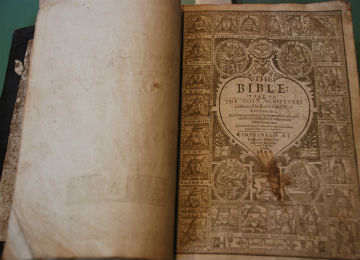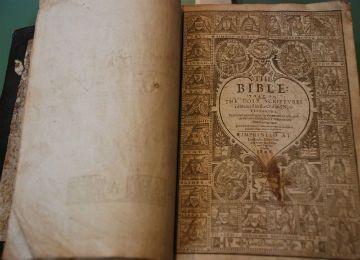
How Can I Know for Sure?[1] remains our ongoing focus in this series of articles.
Both confidence and contentment have eluded many of us. Feet firmly planted in mid-air, we drift from one thought to another and one opinion to another, persuaded by the rhetoric of the speaker’s voice that has most recently stirred our emotions and captured our interest. But any peace, resolve and assurance flee with heartless cruetly, the moment a new crisis faces us or a new argument compels us.
Are we left in such a miserable state? Can we do no better in this life than to float, flounder, and flit?
In our last column, we contemplated the uniqueness of the Bible. Leading up to this assertion to the Bible’s uniqueness, we asked a series of questions. We then argued that because God has spoken, we have a wholly reliable Bible worthy of our unswerving trust.
But just how much confidence should we put in it? After all, the Bible is a human book written by human authors, is it not? Fair questions to which there are strong, God-given, peace-filling answers. Let’s see what God himself says.
In his final New Testament letter, the Apostle Peter warns the first century church of the dangers of false teaching and exhorts them to remain firmly established in the truth of the gospel. The stakes are high. Peter knows not only the blinding persuasion of false teaching, but is also conscious that lives are shaped and ultimate destinies determined by what is believed. Peter’s nagging concern is that the church get its nagging questions answered with the truth.
Read carefully his words in 2 Peter 1,
12 Therefore I intend always to remind you of these qualities, though you know them and are established in the truth that you have. 13 I think it right, as long as I am in this body, to stir you up by way of reminder, 14 since I know that the putting off of my body will be soon, as our Lord Jesus Christ made clear to me. 15 And I will make every effort so that after my departure you may be able at any time to recall these things.
16 For we did not follow cleverly devised myths when we made known to you the power and coming of our Lord Jesus Christ, but we were eyewitnesses of his majesty. 17 For when he received honor and glory from God the Father, and the voice was borne to him by the Majestic Glory, “This is my beloved Son, with whom I am well pleased,” 18 we ourselves heard this very voice borne from heaven, for we were with him on the holy mountain. 19 And we have the prophetic word more fully confirmed, to which you will do well to pay attention as to a lamp shining in a dark place, until the day dawns and the morning star rises in your hearts, 20 knowing this first of all, that no prophecy of Scripture comes from someone's own interpretation. 21 For no prophecy was ever produced by the will of man, but men spoke from God as they were carried along by the Holy Spirit.[2]
After Jesus’ resurrection and just before his departure from earth, Peter found himself in a one-on-one encounter with the Master Teacher (John 21:15-19). Having publicly denied his association with the Lord three times on the night of Jesus’ betrayal (Luke 22:54-62), Peter now finds himself as the recipient not of a sharp rebuke, but of direct yet compassionate shepherding by the very One he rejected. In this conversation, Jesus calls Peter to love him by caring for his “sheep,”[3] that is, the church – the people of faith in Jesus Christ. The task entrusted to Peter as an apostle is that of shepherd. To love Jesus is to love his sheep.
It is evident in Peter’s writings that he never forgot this privileged calling as Jesus’ “under-shepherd”; he feeds and leads the sheep, and calls other church leaders to do the same.[4] Harkening to the Chief Shepherd’s exhortation and model, Peter evidently gave his own life serving the sheep.[5] But not even his death would put an end to his shepherding.
Seeking to perpetuate faithful care for Christ’s sheep even as he anticipates his own “departure” (1:12-15), he directs these sheep to pasture where they may graze safely and confidently. Just as he had relied upon the Scriptures in his preaching and teaching as the means of authoritative speech to the people of God,[6] in his final apostolic letter, Peter calls the sheep to rely unreservedly upon the Word of God. The particular manner in which he does so is arresting.
Having relayed his own riveting experience at the Mount of Transfiguration, where he witnessed a pre-resurrection vision of the glorified Christ and heard the voice of God the Father expressing approval of his own Son (Luke 9:28-36), Peter orients his readers to the same mighty voice of God, captured permanently in the “prophetic word” (1:19).[7] In fact, he urges his readers to an unqualified trust in this Word. The voice of God is self-attesting.[8] There is nowhere else to go nor could there be any possible need for verification. When a lion roars, one does not wonder if it was a mouse.
Peter’s pastoral heart glows warmly. While his readers will soon no longer enjoy personal apostolic ministry after the close of the apostolic age, he assures them they have a vital source of certain and reliable truth. Prophetic and apostolic word persists in Scripture. To ensure their protection and care, he points them away from experiences (even those as heart-pumping as hearing the voice of God when Jesus’ face was gloriously transfigured) and towards the written revelation of God. Peter points the sheep to the Scriptures.
Why does Peter display such confidence in the Bible? Why does he urge the church towards Scripture in the face of his departure and the always-imminent threat of false teaching (2 Peter 2:1-3)? The reason is singular and explicit. Peter commends the church to the Bible because of what the Bible is.
To bring his point home, he categorically denies that the Scriptures are a human creation. Contrary to what some both of Peter’s day and our own age infer, the words of Scripture do not come from man either by origin or interpretation. The writing of Scripture comes neither by human motive nor human creativity. The Bible is neither of men nor by men.
More specifically, the prophetic words of Scripture are not even an expression of the impressions or interpretations of the prophets about what they saw. No human author simply watched the amazing acts of God and then wrote what he thought about what he saw. Scripture is no mere human witness to God’s mighty acts.
It is much more than that. The “prophetic word” (1:19) has a supreme and divine quality, giving it a character unlike any other book. He does not concern himself with the precise mechanics of the Holy Spirit’s direction of the human author; he does not specify how the Spirit interfaced with the human writer. Rather, he describes something much more poignant and critical.
He explains how the words of Scripture come by the Spirit of God, so that the written product is not of human but of divine origin. So while the human writers indeed took pen in hand, the words they wrote are wholly God’s words. To demonstrate the Bible’s supreme reliability, Peter paints a word picture. Employing the language of a sailing vessel whose sail is filled and is carried along by the wind, Peter describes the prophets as men “carried along” (1:21) by the Holy Spirit.
The men’s sails are hoisted, and the Spirit fills them, guiding them to the destination God determined and desired. Human agency is real, but the product of Scripture is wholly divine. The Holy Spirit of God takes the prophets strictly where he wishes to take them, making the very words written, the words of God himself.
In short, the prophetic Word is the Word of God. More precisely, the words of Scripture are the product of the Holy Spirit.[9] And herein lies the critical point. Scripture is to be trusted because of its Author. To speak of the Word of God is to speak of the Spirit’s product, and the Spirit of truth[10] operates in and with this Word. What makes Scripture powerful, or “living and active”,[11] is that the words are God’s very own.
Scripture delivers a final and vital authority for our pure confidence. It is no product of man, no fabrication of human intellect. It is not from us, but comes to us. It is in the truest sense, God’s Word. “The Bible is the living voice of the Holy Spirit today. This is the structure or pattern of working which the Spirit has set for himself in his sovereign freedom.”[12]
It is also the source of our freedom, for the one who relies wholly upon the Word of God, will be secure. Scripture delivers ultimate confidence for ultimate rest. Jesus himself did not equivocate, “Everyone then who hears these words of mine and does them will be like a wise man who built his house on the rock. And the rain fell, and the floods came, and the winds blew and beat on that house, but it did not fall, because it had been founded on the rock.”[13]
[1] The booklet, How Can I Know For Sure?, contains a series of questions after each section, intended for group discussion. To purchase a copy, go to http://www.reformedresources.org/books/how-can-i-know-for-sure/.
[2] 2 Peter 1:12–21.
[3] The image of sheep is a common one for the people of God. Perhaps the most recognizable Old Testament verse, Psalm 23:1, begins, “The Lord is my shepherd.”
[4] 1 Peter 5:1–5.
[5] While the New Testament gives no account of Peter’s death, extra-biblical literature indicates that he was martyred.
[6] Acts 2:14–36; 3:11–26.
[7] By “prophetic word,” Peter has in mind the whole of Scripture – especially the Old Testament. But the New Testament is not outside his purview either, because he is conscious of the divine authority given to apostolic writings in parallel to that of the Old Testament prophets (2 Peter 3:2). In fact, he explicitly places Paul’s apostolic writings on par with the Holy Spirit-generated writings of the prophets (2 Peter 3:16).
[8] By self-attesting we mean that its authority cannot be measured by comparison to something outside itself, because as God’s voice it possesses final authority.
[9] To put it in the Apostle Paul’s terms, Scripture is theopneustos (Greek), which means it is “God-breathed” or God-Spirited (2 Timothy 3:16). Here Paul makes the same point to Timothy about the nature of Scripture that the Apostle Peter makes to his readers.
[10] John 14:17; 16:13–15.
[11] Hebrews 4:12.
[12] Richard B. Gaffin, Jr., “The Holy Spirit,” Westminster Theological Journal 43.1 (Fall 1980), 63.
[13] Matthew 7:24–25.

The Alliance of Confessing Evangelicals is member supported and operates only by your faithful support. Thank you.
















 © Alliance of Confessing Evangelicals
© Alliance of Confessing Evangelicals


